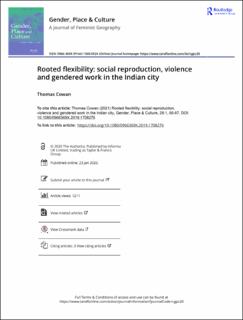Rooted flexibility: social reproduction, violence and gendered work in the Indian city
Journal article, Peer reviewed
Published version

Åpne
Permanent lenke
https://hdl.handle.net/11250/2766773Utgivelsesdato
2021Metadata
Vis full innførselSamlinger
Originalversjon
Gender, Place & Culture: A Journal of Feminist Geography. 2021, 28(1), 66-87. 10.1080/0966369X.2019.1708276Sammendrag
Drawing on feminist marxist and feminist geography scholarship the article develops the concept 'rooted flexibility' to examine the latent frictions between flexible labour regimes and the rooted, gendered demands of social reproduction in worker tenements and factories in Gurgaon, India. The article explores the everyday gendered terrain through which migrant women are incorporated into, disciplined and navigate flexible labour and precarious social reproduction in the city. Unlike the male migrant workers who are made flexible through ideologies and practices of mobility, the mobility of migrant working-class women whose stories are narrated in this article is constrained by patriarchal control and responsibilities to social reproductive labour. In the absence of labour mobility, the article explores how migrant women workers navigate conflicting demands of being both flexible waged-workers and rooted, ‘respectable’ housewives, resisting violent practices of labour discipline on the shop-floors and tenements. In doing so, the article examines how an embodied and differentiated politics of 'respectability' comes to materialise how ‘rooted flexibility’ is lived, contested and secured.
